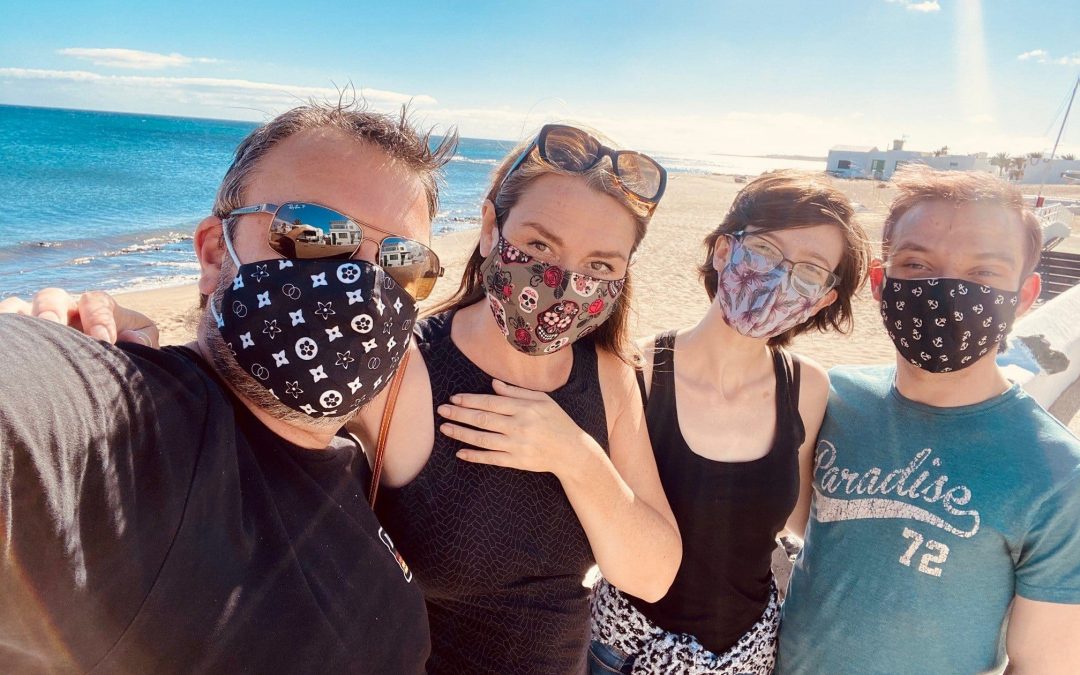Most people know that travelling during the covid pandemic has been challenging, with rapidly changing rules and regulations to follow, writes Bremain Vice Chair Lisa Ryan Burton for Yorkshire Bylines. On a recent visit to the UK from Spain, the differences in attitude and approach to mask-wearing and the risk from covid was noticeable and unnerving. Particularly as the UK’s approach has implications for the rest of the world.As a UK national resident in Spain, like many of us after 20 months of not being able to travel, I was desperate to get back to the UK. Not only to catch up with my adult children, parents, and extended family, but to visit my distribution business in England to see my team face to face for the first time in two years.
Visiting the UK for the first time in almost two years
In August 2021, the UK government eventually recognised the EU digital covid certificate. Before this change, travelling to the UK required ten days isolation and three tests minimum. This meant to see family for a week, at least three weeks away was needed. My family live in England, Scotland, and Wales, so even if I had travelled previously, restrictions between the four nations made visiting them almost impossible.
I recently experienced differences in attitudes between the Spanish and British on mask-wearing while visiting one of the tourist areas in Spain. While it was wonderful to see businesses open again and tourists return, I saw practically no mask-wearing amongst the tourists. This was a stark difference to visiting a Spanish town, where even in a moderately quiet street almost everyone would wear a mask.
I therefore knew it would be interesting to see how attitudes differed in Britain. My flight was into Birmingham, and my first experience was when I got into a black cab. The driver immediately stated, “You don’t need to wear your mask if you don’t want to”.
Almost no indoor or outdoor mask wearing in England
I arrived at my hotel late and had to check-in at the bar/restaurant, and I was taken aback. I had not seen so many ‘unmasked’ people in an indoor environment for over 20 months. None of the bar staff wore masks; people were around the bar, being served at the bar, passing through to use the bathrooms, sitting at tables and mingling outside – with not a mask in sight.
For the first time since Spain made face coverings mandatory in all public places in May 2020, I felt strange, awkward and out of place wearing one. I checked in, got a drink, and sat at an outside table.
Over the next few days, I noted that very few people were wearing masks. It felt as if there were no covid restrictions at all in place; the world had reverted to normal. No one was breaking covid regulations though because, since 19 July 2021, England doesn’t have any.
The government website now states, “Lifting restrictions does not mean the risks from COVID-19 have disappeared, but at this new phase of the pandemic response, we are moving to an approach that enables personal risk-based judgments”.
Personal risk-based judgments? My feeling was that if I were a vulnerable person to covid, which I thankfully am not, my risk assessment would be bleak. How can you protect yourself when there seems to be no social responsibility within the community, or indeed a desire to protect each other?
Face coverings in Scotland and Wales
I then flew to Scotland to spend a few days there with my family. In Scotland, it is still a legal requirement to wear a mask in public indoor settings.
While there, I visited restaurants, shops, and tourist attractions. It was a very different experience. I once again felt that I was living in a pandemic. Although few people on the streets wore masks, face coverings were enforced in shops, tourist attractions, restaurants, and bars, including staff. There was no bar service, and people wore masks when not at their tables or when moving around. But when I got a private taxi, the driver again said I did not have to wear a mask, which was in contradiction to the law.
For the last leg of my journey, I flew back to Manchester for a day before catching a train to Cardiff, Wales. Once again, people behaved as if there were no risk of covid transmission. The train had three carriages, no bookable seats and was completely packed with some passengers standing. At a rough calculation, approximately one in 20 were wearing masks; that demographic was primarily elderly.
Mask-wearing and covid restrictions are slightly different in Wales too. It is still a legal requirement for face coverings to be worn in all indoor public places, public transport, and taxis, but not in the hospitality sector.
I saw no mask-wearing in restaurants or bars; however, there was high compliance with mask-wearing in supermarkets and most shops, although I did notice that in some small, privately owned shops, masks were not enforced. Once again, a taxi driver told me that I didn’t have to wear a mask if I didn’t want to, even though it is a legal requirement in Wales.
UK has one of the worst covid responses in the world
As a fully vaccinated person, to travel to the UK, I had to pay for a test 72 hours before arrival in Britain, order a day two test before departing Spain, and fill in a passenger locator form. However, what is the point of a day two test? There is no requirement for isolation before the test or indeed if it returns a positive result. For my return to Spain, I only had to fill in a passenger locator form and have my EU covid digital certificate.
It comes as no surprise that the UK has had one of the worst covid responses in the world and even now has the worst infection rate by far in Western Europe. It is currently ranked 12th worst in the world for infection levels.
What happened to that ‘world beating’ vaccine success story? Britain had a great start, but public health messaging was always chaotic, and frankly, it seems the government is too. That head start has been wasted.
Returning to the relative safety of Spain
Spain, like Italy, had a dreadful start to the pandemic but has done its best to learn from mistakes and has taken coronavirus very seriously. Some 76.9 percent of Spain’s population is now fully vaccinated; that includes 12 years and above. An impressive 90 percent of the ‘vaccinable population’ has had at least one dose. Yet, the level of social responsibility and adherence to the rules remains high. Spain is recovering quickly and is expected to have the fastest growing economy in the bloc, this year and next. A solid, consistent approach has done the country well. On 1 October, Spain had 2,037 new cases, the UK had 34,589.
It was great to go home to see the family, but it was good to come home to my host country. Some may think the strict rules and public adherence are excessive now, or a form of ‘control’. I see it as part of our social responsibility. After all, covid isn’t over for any of us until it is over for all of us.








